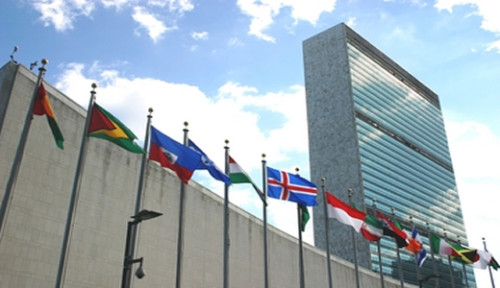PHOTO: The UN building in New York City
Rosa Freedman of the University of Birmingham writes for The Conversation:
The United Nations was born 70 years ago, emerging from the horrors of World War II. After the failure of its predecessor, the League of Nations, the UN heralded the dawn of a new era, with the promise that all peace-loving nations would join together to ensure international peace and security, development, and human rights. And on many measures, it has made good on that promise.
Over the past 70 years there have been a great many wars, but none that have consumed the entire world. Almost all countries around the world have become self-governing and autonomous. Individuals’ rights and freedoms have been promoted and protected in ways that could never have been imagined in preceding decades or centuries.
But of course, the UN’s successes ought not to blind us to the many ways in which it and the world alike desperately need improving.
The UN’s member states both fund the organisation and direct its work, so any assessment of the UN cannot but be an assessment of its members’ behaviour. While the UN Charter insists that membership is open to peace-loving states, there are very many countries that do not fulfil those criteria. Indeed, many of them have dubious, even repugnant domestic and international records on trade, weapons, human rights, and very many other areas that undermine the UN’s ideals and aims.
But should the UN really have excluded these countries? If dictators, totalitarian regimes, and despots were kept out, the UN would only stand accused of neo-imperialism, of interference in the affairs of countries it looked down on. If weapons exporters and military powers were excluded, there would be no central diplomatic and political forum in which to try and stop them from waging wars.
It remains an insurmountable problem. As long as they have seats at the UN table, these countries are necessarily able to influence the UN’s work and activities, and sometimes undermining its aims and ideals.
With Members Like These….
Of course, individual member states can hardly dictate to the UN at will. In a body of 193 members, only the most powerful handful are able to exert influence as they pleased. Usually countries use their regional groups and political blocs to advance their aims, and the more pernicious those aims, the more allies a country has to rely on to achieve its aims.
While we can no more stop countries from having alliances than we can stop children from making friends in a playground, we cannot deny that those alliances have undermined and politicised the UN throughout its history. They have stalled or hampered the UN’s work in myriad ways, often forcing it either to focus excessively on some issues or to fail altogether to address others.
Some UN bodies were barely functional during the Cold War, particularly the Security Council, which was precluded from taking many essential actions because of the East/West divide. The Cold War is also one of the main reasons the UN does not have a standing army, even as its creators envisaged one would be set up under Chapter 7 of the UN Charter.
Instead, the UN relies on peacekeepers from member states’ national militaries, and those peacekeepers often turn out to be impotent when it comes to preventing grave atrocities. They have to be invited into a country before joining the fray, and even then, they’re often unable to intervene at the level needed to prevent genocides and crimes against humanity. Failures in Rwanda, Sri Lanka and the former Yugoslavia will forever haunt the UN and stain its reputation.
And then there are the rogue regimes that visit horrific conditions on many of their people – from Zimbabwe to Qatar, from the Gambia to Uzbekistan – while enjoying the protection of their mates or trade partners. They stay off the radar because their political ties enable them to conduct domestic affairs without the spotlight being shone into their lands.
But Still There is Success
But for all these shortcomings and failures, it cannot be denied that a world without the UN would be a poorer and more unstable one. There are many success stories, ranging from decolonization to financial development, from responses to epidemics to vaccination programs, from assisting refugees and displaced people to dealing with all manner of other humanitarian disasters.
Indeed, the best successes can often be chalked up to UN staff being allowed to get on with their jobs without member states politicizing their work. That is what we should celebrate and seek to harness – depoliticized work on crucial areas, and the hope that countries will eventually put the good of the world above their own interests.
![]()

